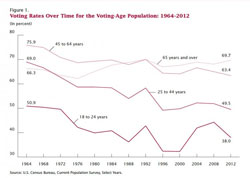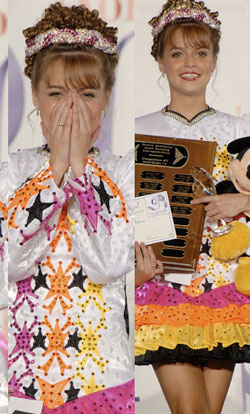Data from the US Census Bureau predicts a low voter turnout in 18-24 year olds for the upcoming 2016 presidential elections. Less than half the population of eligible young adult voters are expected to participate in the voting process.
Janice Stapley, Associate Professor of the Department of Psychology, correlates low voter turnout in young adults as a probable effect of western culture. “Emerging adults tend to be very self-focused, especially in western cultures where individualism is highly valued. They don’t feel like it is as important as what goes on in their daily life,” she said. “Of course this is a generalization and there is a small subgroup of young people that are very politically involved, but they are the exception – not the norm,” said Stapley.
Christopher Lambiase, a graduate student earning his masters in Homeland Security, is an example of what Stapley considers “not the norm”. Lambiase deduces that it is his responsibility to take part in the voting process. “It is my way of contributing to the nation,” he said.
Giana Breucella, a junior English major, represents a large majority of potential young adult voter who are considerably disconnected from the presidential campaign. “In my age group I feel like I never hear people talking about politics. I am probably not going to vote. I feel like it’s kind of pointless. I don’t know much about politics, and I feel like in order to vote I should know more.”
“The number one predictor of voter turnout is the level of education. The more educated you are the more likely you are to vote,” said Joseph Patten, the Chair of the Department of Political Science and Sociology.
“I feel like a good amount of college students don’t really know about the candidates that are running,” said Malik Johnson, a senior communications major. However, he asserts that this is not the case for all students. “There are others that do know about the candidates but don’t really like them. For example, Hillary Clinton is the frontrunner for the democrats right now, but I don’t think many students really care for her,” he said.
According to Patten, disinterest or dislike are not the only major factors inhibiting young adults from the voting booths. Patten considers various obstructions caused by structural and societal components.
“Rigid voter registration laws across states that require voters to register well in advance of the election tend to disproportionately hurt young people because one third of 18-29 year olds tend to change addresses every two years. States with same day voter registration like Maine, Minnesota, and Wisconsin tend to have higher voter turn outs of young people,” he said.
A way in which young adults have access to the political views of candidates is through the 2016 Presidential Candidate Debates.
“I hate the debates,” said Breucella. “I think that it is all extremely shady. The majority of the time all you see are the candidates talking about what other politicians did wrong instead of building themselves up. They go back and forth trying to undercut one another. That doesn’t make me want to vote for them. It all seems like one big popularity contest,” she said.
Johnson wants politicians to discuss more topics that might be of interest to young voters during the debates.
“A lot of the politicians are not thinking about our generation. If they want our attention they should consider us in their arguments. I have watched the debates, and they talk about things like foreign policy, terrorism, and things like that, but people my age are interested in other things like debt and health insurance. That’s why so many young people turned out for the 2008 election with Barack Obama, because he hit topics that were really important to college aged kids,” Johnson said.
According to Patten, Johnson’s assumptions are statistically sound. “Voter turnout in the 18-29 year old demographic surged in 2004 and 2008. The youth vote played a large role in electing President Obama in the 2008 election,” said Patten.
The U.S. Bureau’s calculated estimates of young adult turnout may be correct, however, the University does have students interested in influencing others to vote.
“During the elections we have the opportunity to let our voices be heard,” said Johnson. “I think everyone should take advantage of that.”
IMAGE TAKEN from http://www.ttuhub.net/2015/03/college-students-avoid-the-voting-polls/


